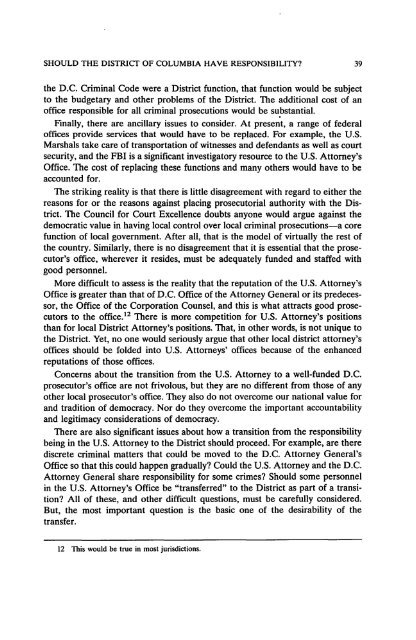Download Electronic Version - UDC Law Review
Download Electronic Version - UDC Law Review
Download Electronic Version - UDC Law Review
Create successful ePaper yourself
Turn your PDF publications into a flip-book with our unique Google optimized e-Paper software.
SHOULD THE DISTRICf OF COLUMBIA HAVE RESPONSIBILITY? 39<br />
the D.C. Criminal Code were a District function, that function would be subject<br />
to the budgetary and other problems of the District. The additional cost of an<br />
office responsible for all criminal prosecutions would be su~stantial.<br />
Finally, there are ancillary issues to consider. At present, a range of federal<br />
offices provide services that would have to be replaced. For example, the U.S.<br />
Marshals take care of transportation of witnesses and defendants as well as court<br />
security, and the FBI is a significant investigatory resource to the U.S. Attorney's<br />
Office. The cost of replacing these functions and many others would have to be<br />
accounted for.<br />
The striking reality is that there is little disagreement with regard to either the<br />
reasons for or the reasons against placing prosecutorial authority with the District.<br />
The Council for Court Excellence doubts anyone would argue against the<br />
democratic value in having local control over local criminal prosecutions-a core<br />
function of local government. After all, that is the model of virtually the rest of<br />
the country. Similarly, there is no disagreement that it is essential that the prosecutor's<br />
office, wherever it resides, must be adequately funded and staffed with<br />
good personnel.<br />
More difficult to assess is the reality that the reputation of the U.S. Attorney's<br />
Office is greater than that of D.C. Office of the Attorney General or its predecessor,<br />
the Office of the Corporation Counsel, and this is what attracts good prosecutors<br />
to the office. 12 There is more competition for U.S. Attorney's positions<br />
than for local District Attorney's positions. That, in other words, is not unique to<br />
the District. Yet, no one would seriously argue that other local district attorney's<br />
offices should be folded into U.S. Attorneys' offices because of the enhanced<br />
reputations of those offices.<br />
Concerns about the transition from the U.S. Attorney to a well-funded D.C.<br />
prosecutor's office are not frivolous, but they are no different from those of any<br />
other local prosecutor's office. They also do not overcome our national value for<br />
and tradition of democracy. Nor do they overcome the important accountability<br />
and legitimacy considerations of democracy.<br />
There are also significant issues about how a transition from the responsibility<br />
being in the U.S. Attorney to the District should proceed. For example, are there<br />
discrete criminal matters that could be moved to the D.C. Attorney General's<br />
Office so that this could happen gradually? Could the U.S. Attorney and the D.C.<br />
Attorney General share responsibility for some crimes? Should some personnel<br />
in the U.S. Attorney's Office be "transferred" to the District as part of a transition?<br />
All of these, and other difficult questions, must be carefully considered.<br />
But, the most important question is the basic one of the desirability of the<br />
transfer.<br />
12 This would be true in most jurisdictions.














